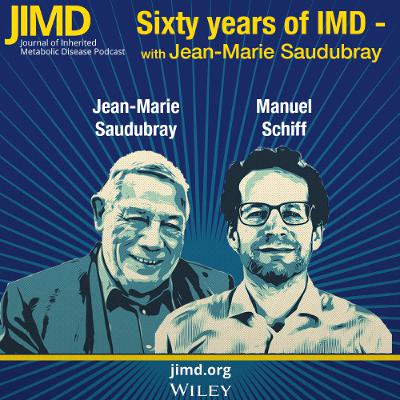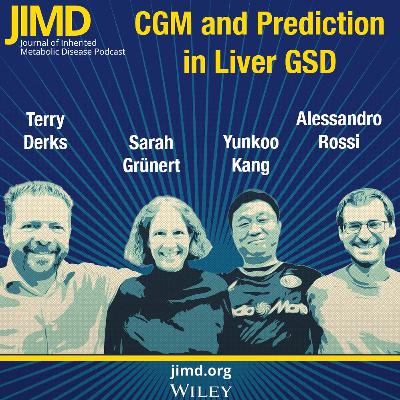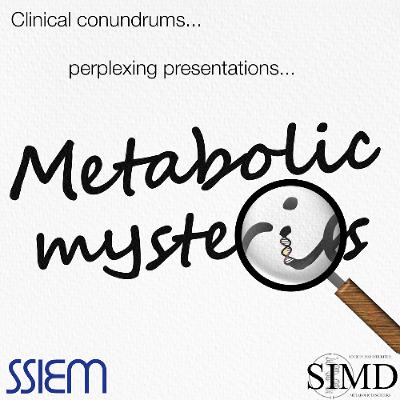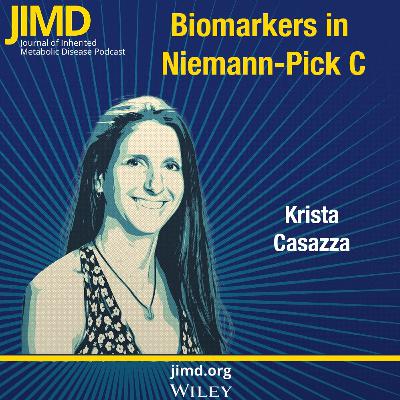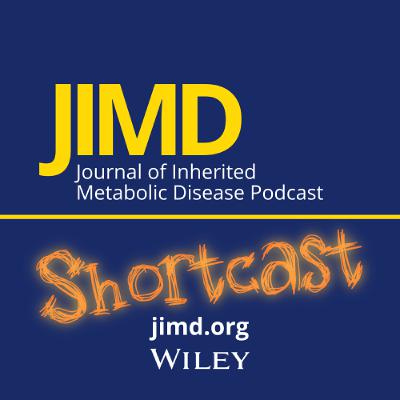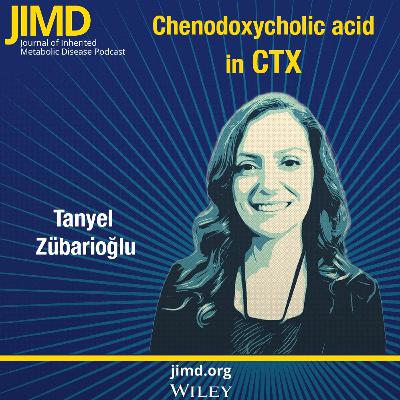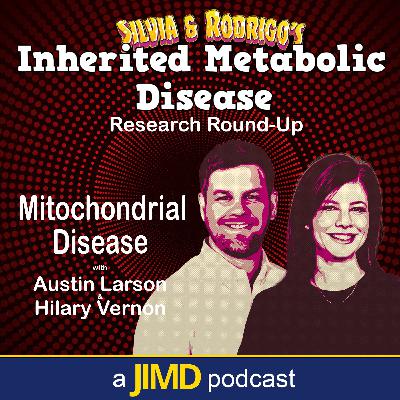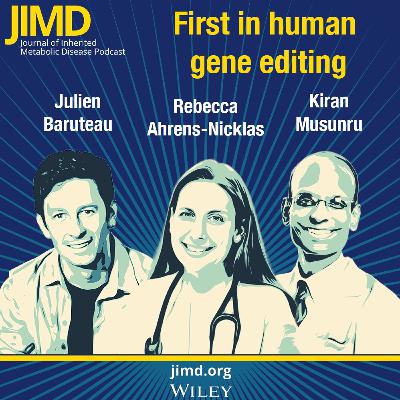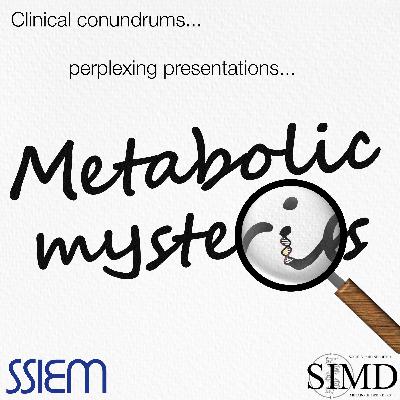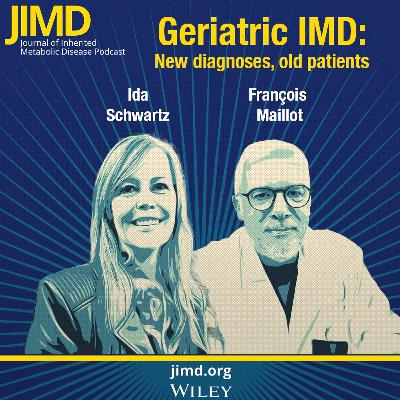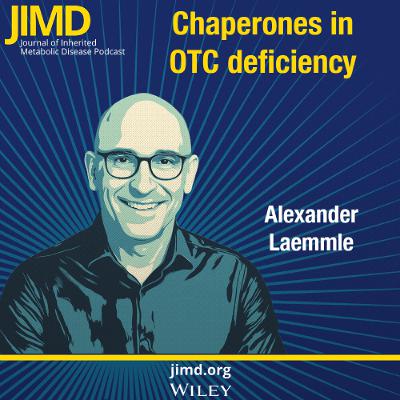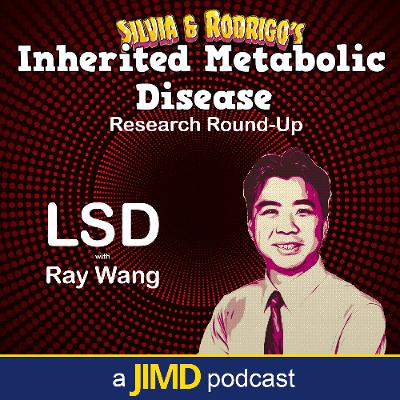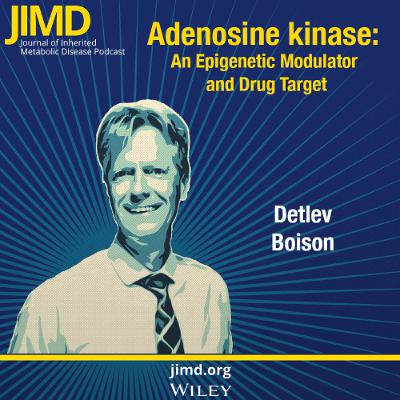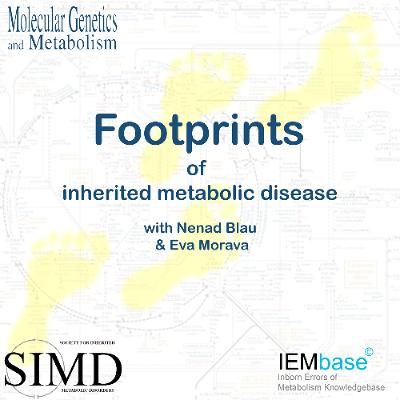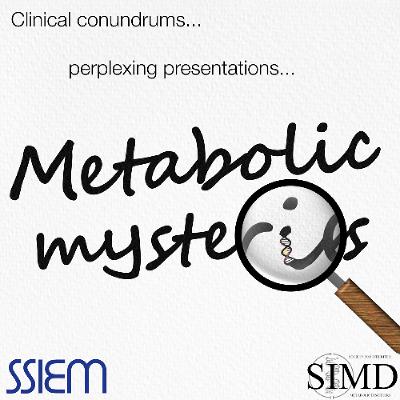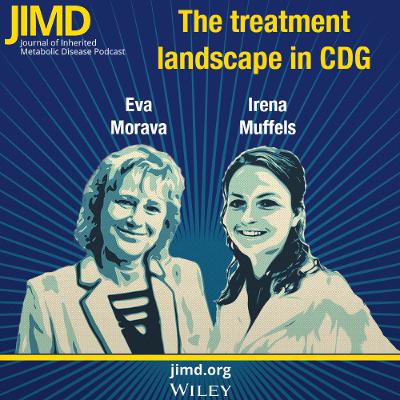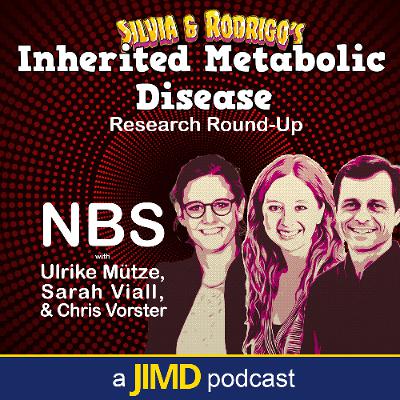Discover JIMD Podcasts
JIMD Podcasts

JIMD Podcasts
Author: Journal of Inherited Metabolic Disease
Subscribed: 34Played: 2,204Subscribe
Share
© All rights reserved
Description
JIMD Podcasts is home to the Journal of Inherited Metabolic Disease podcast and the JIMD Shortcast. We're also proud to showcase Metabolic Mysteries and the new Footprints in IMD podcast.
243 Episodes
Reverse
Join us for a rare conversation with Professors Jean-Marie Saudubray and Manuel Schiff as they reflect on six decades of progress in inherited metabolic diseases, from the earliest chromatograms to the dawn of genomic medicine. This episode explores the discoveries, collaborations, and human stories that shaped the field and continue to guide its future.
A Brief History of Inherited Metabolic Diseases: A Personal 60 Years Clinical Flashback
Jean-Marie Saudubray, Manuel Schiff
https://doi.org/10.1002/jimd.70063
In this episode of the JIMD Podcast, Terry G. J. Derks, Alessandro Rossi, Sarah C. Grünert and Yunkoo Kang talk about the evolving role of continuous glucose monitoring (CGM) in liver glycogen storage diseases. The conversation spans international consensus on CGM use and an exciting deep-learning approach to predicting hypoglycaemia, pointing towards more personalised and preventive care for people living with GSD.
State of the Art and Consensus Statements by Healthcare Providers, Patients, and Caregivers on Continuous Glucose Monitoring in Liver Glycogen Storage Diseases
Terry G. J. Derks, et al
https://doi.org/10.1002/jimd.70040 and
A deep learning approach for blood glucose monitoring and hypoglycemia prediction in glycogen storage disease
Ji Seung Ryu, et al
https://www.nature.com/articles/s41598-025-97391-8
A child with severe developmental delay and an early-onset tumour sets the stage for a remarkable case of genetic investigation. In this episode, Sally Ann Lynch and Alfonso D’Alessio uncover how functional testing transformed an uncertain variant into a key diagnostic insight.
Read the article: https://doi.org/10.1002/ajmg.a.64275
Krista Casazza talks about validating key biomarkers in Niemann-Pick type C and why they are essential for future clinical trials and regulatory approval. The discussion focuses on emerging candidates such as 24-hydroxycholesterol, neurofilament light chain, and calbindin-D, alongside the urgent need for data harmonisation and collaboration across the NPC community.
Biomarker Validation in NPC1: Foundations for Clinical Trials and Regulatory Alignment
Krista Casazza, et al
https://doi.org/10.1002/jimd.70075
In this JIMD Shortcast, Allyson Terrell and Katie Sapp explore the real-world challenges of newborn screening for lysosomal storage disorders, based on a survey of healthcare professionals working at the front line of implementation. The study highlights the limitations of single-tier screening, the value of multi-tier testing, and the growing importance of multidisciplinary collaboration to improve diagnostic clarity and patient outcomes.
Exploratory Study on the Challenges of Newborn Screening for Lysosomal Storage Disorders Emphasizes the Need for Multitier Testing and Collaborative Approaches to Management
A. Terrell, et al
https://doi.org/10.1002/jmd2.70027
A nationwide CTX study, a critical treatment window, and a conversation with the lead author. Dr Tanyel Zübarioğlu joins the JIMD Podcast to unpack the long-term impact of CDCA therapy and why timing matters more than ever.
Long-Term Outcomes of Chenodeoxycholic Acid Therapy for Cerebrotendinous Xanthomatosis: A Nationwide Study on Prognostic Factors and Treatment Tanyel Zubarioglu, et al
https://doi.org/10.1002/jimd.70069
Editorial Comment to Regulatory News
Carla E. M. Hollak, Natalja Bouwhuis
https://doi.org/10.1002/jimd.70071
The Research Round-Up returns! Hosts Silvia Radenkovic and Rodrigo Starosta are joined by Dr Hilary Vernon and Dr Austin Larson for a deep dive into the latest discoveries in mitochondrial disease.
Together they explore how new biomarkers like FGF21 and GDF15 are reshaping diagnosis, how multi-omics approaches are accelerating precision care, and what large-scale data from gnomAD to stem-cell models is revealing about disease mechanisms and therapeutic opportunities.
A lively, expert-led discussion connecting science, diagnostics, and patient impact across the mitochondrial field.
Laricchia KM, et al
Mitochondrial DNA variation across 56,434 individuals in gnomAD. Genome Res. 2022 Mar;32(3):569-582. doi: 10.1101/gr.276013.121. Epub 2022 Jan 24. PMID: 35074858; PMCID: PMC8896463.
Liu O, et al
FGF21 and GDF15 are elevated in Barth Syndrome and are correlated to important clinical measures. Mol Genet Metab. 2023 Nov;140(3):107676. doi: 10.1016/j.ymgme.2023.107676. Epub 2023 Aug 2. PMID: 37549445.
Van Hove JLK, et al
Protein biomarkers GDF15 and FGF21 to differentiate mitochondrial hepatopathies from other pediatric liver diseases. Hepatol Commun. 2024 Jan 5;8(1):e0361. doi: 10.1097/HC9.0000000000000361. Erratum in: Hepatol Commun. 2024 Jan 29;8(2):e0390. doi: 10.1097/HC9.0000000000000390. PMID: 38180987; PMCID: PMC10781130.
Starosta RT, et al
An integrated multi-omics approach allowed ultra-rapid diagnosis of a deep intronic pathogenic variant in PDHX and precision treatment in a neonate critically ill with lactic acidosis. Mitochondrion. 2024 Nov;79:101973. doi: 10.1016/j.mito.2024.101973. Epub 2024 Oct 15. PMID: 39413893; PMCID: PMC11578067.
Jain IH, et al
Hypoxia as a therapy for mitochondrial disease. Science. 2016 Apr 1;352(6281):54-61. doi: 10.1126/science.aad9642. Epub 2016 Feb 25. PMID: 26917594; PMCID: PMC4860742
Sandlers Y, et al
Metabolomics Reveals New Mechanisms for Pathogenesis in Barth Syndrome and Introduces Novel Roles for Cardiolipin in Cellular Function. PLoS One. 2016 Mar 25;11(3):e0151802. doi: 10.1371/journal.pone.0151802. PMID: 27015085; PMCID: PMC4807847.
Sniezek Carney O, et al.
Stem cell models of TAFAZZIN deficiency reveal novel tissue-specific pathologies in Barth syndrome. Hum Mol Genet. 2025 Jan 23;34(1):101-115. doi: 10.1093/hmg/ddae152. PMID: 39535077; PMCID: PMC11756277.
Here’s a polished podcast blurb suitable for LinkedIn, BlueSky, or Apple Podcasts listings — written in the JIMD Podcast tone and style:
⸻
It’s one of the most talked-about breakthroughs of 2025, a first-in-human demonstration of in vivo gene editing to treat an inherited metabolic disease.
In this episode, Kiran Musunuru and Rebecca Ahrens-Nicklas are joined by Julien Baruteau to unpack what this means for the field. They explore the science behind gene editing, the importance of ethical design, and the emotional weight of stopping therapy once enzyme function is restored.
The conversation bridges the NEJM landmark paper (Musunuru et al., 2025) and the accompanying JIMD editorial (Rahman & Baruteau, 2025), reflecting on what this moment tells us about the future of metabolic medicine and how ready we are for it.
First in Human Gene Editing for an Inherited Metabolic Disease
Shamima Rahman, Julien Baruteau
https://doi.org/10.1002/jimd.70056
Patient-Specific In Vivo Gene Editing to Treat a Rare Genetic Disease
Kiran Musunuru, et al
https://www.nejm.org/doi/10.1056/NEJMoa2504747
Dr Samuel Mackenzie discusses the perplexing presentation of a 61-year-old man with rhabdomyolysis and a prolonged QT interval. Further exploration reveals a lifetime of episodic fatigue with illnesses.
https://doi.org/10.1016/j.ymgmr.2025.101241
Inherited metabolic diseases aren’t just for the young.
James Nurse talks with François Maillot and Ida Schwartz about their systematic review revealing how IMDs can first be diagnosed well into older age. From Fabry disease to alkaptonuria, they discuss diagnostic delays, missed clues, and why it’s time to think about geriatric metabolic medicine.
Diagnosis of Inherited Metabolic Disease in Older Patients: A Systematic Literature Review
Maria-Rita Moio, et al
https://doi.org/10.1002/jimd.70038
With Rodrigo off caring for sick children, James Nurse joins Silvia Radenkovic to speak with Dr Judith Jans and Dr Devin Oglesbee about the emerging field of untargeted metabolomics.
Authors’ opinions are their own and do not represent their institutions.
Referenced papers include:
Miller MJ, et al
The emerging role of metabolomics analysis in genetic and genomic testing: A points to consider statement of the American College of Medical Genetics and Genomics (ACMG). Genet Med. 2025 Jul 17:101493. doi: 10.1016/j.gim.2025.101493. Epub ahead of print.
Evans AM, et al
Dissemination and analysis of the quality assurance (QA) and quality control (QC) practices of LC-MS based untargeted metabolomics practitioners. Metabolomics. 2020 Oct 12;16(10):113. doi: 10.1007/s11306-020-01728-5.
Wurth R, et al.
An evaluation of untargeted metabolomics methods to characterize inborn errors of metabolism. Mol Genet Metab. 2024 Jan;141(1):108115. doi: 10.1016/j.ymgme.2023.108115. Epub 2023 Dec 15.
Haijes HA, et al.
Direct Infusion Based Metabolomics Identifies Metabolic Disease in Patients' Dried Blood Spots and Plasma. Metabolites. 2019 Jan 11;9(1):12. doi: 10.3390/metabo9010012.
Willems AP, et al
A one-year pilot study comparing direct-infusion high resolution mass spectrometry based untargeted metabolomics to targeted diagnostic screening for inherited metabolic diseases. Front Mol Biosci. 2023 Nov 2;10:1283083. doi: 10.3389/fmolb.2023.1283083.
Haijes HA, et al.
Aspartylglycosamine is a biomarker for NGLY1-CDDG, a congenital disorder of deglycosylation. Mol Genet Metab. 2019 Aug;127(4):368-372. doi: 10.1016/j.ymgme.2019.07.001. Epub 2019 Jul 9. PMID: 31311714.
Hoegen B, et al
Application of metabolite set enrichment analysis on untargeted metabolomics data prioritises relevant pathways and detects novel biomarkers for inherited metabolic disorders. J Inherit Metab Dis. 2022 Jul;45(4):682-695. doi: 10.1002/jimd.12522. Epub 2022 May 22. PMID: 35546254; PMCID: PMC9544878.
Gao Q, et al
A diagnostic algorithm for inherited metabolic disorders using untargeted metabolomics. Metabolomics. 2025 Jul 27;21(4):101. doi: 10.1007/s11306-025-02302-7. PMID: 40715884; PMCID: PMC12301266.
Kerkhofs MHPM, et al.
Cross-Omics: Integrating Genomics with Metabolomics in Clinical Diagnostics. Metabolites. 2020 May 18;10(5):206. doi: 10.3390/metabo10050206.
Ashenden AJ, et al.
The Multi-Omic Approach to Newborn Screening: Opportunities and Challenges. Int J Neonatal Screen. 2024 Jun 21;10(3):42. doi: 10.3390/ijns10030042.
Liu N, et al.
Comparison of Untargeted Metabolomic Profiling vs Traditional Metabolic Screening to Identify Inborn Errors of Metabolism. JAMA Netw Open. 2021 Jul 1;4(7):e2114155. doi: 10.1001/jamanetworkopen.2021.14155.
Can small molecules stabilise OTC enzyme activity and change the outlook for urea cycle disorders? Dr Alexander Laemmle (University Hospital Bern) discusses pharmacological chaperones, a novel approach that strengthens enzyme stability in patient-derived liver models and offers new hope for female OTC carriers.
Novel Treatment Strategy for Patients With Urea Cycle Disorders: Pharmacological Chaperones Enhance Enzyme Stability and Activity in Patient-Derived Liver Disease Models
Adhuresa Ramosaj, et al
https://doi.org/10.1002/jimd.70043
Induced pluripotent stem cell technology as diagnostic tool in patients with suspected ornithine transcarbamylase deficiency lacking genetic confirmation
Adhuresa Ramosaj et al
https://doi.org/10.1016/j.ymgmr.2023.101007
Shortcast: Clinical and Developmental Outcomes after 50 Years of Galactosaemia NBS in Ireland by Journal of Inherited Metabolic Disease
In this episode we discuss new insights into the variability of long-term outcomes in classic galactosemia. Joining me are Nikki Smith, Olivia Garrett, and Judy Fridovich-Keil, who together explore how complications in cognitive, motor, and speech domains emerge, cluster, and vary in severity across patients. Their study highlights both patterns and unanswered questions, illustrating the challenges families face and the importance of refining prognostic tools.
Patterns of Penetrance and Expressivity of Long-Term Outcomes in Classic Galactosemia
Nicole H. Smith et al.
https://doi.org/10.1002/jimd.70020
Silvia and Rodrigo are joined by Dr Ray Wang, Director of the multidisciplinary Foundation of Caring Lysosomal Storage Disorder Program at the Children's Hospital of Orange County. Silvia asks Dr Wang and Rodrigo (who also happens to be a researcher in this field) about cutting-edge advances in LSD research: from base editing in Pompe disease and patient-specific in vivo gene editing, to new biomarkers and scoring systems in Gaucher disease, insights into lipid dysregulation across lysosomal storage disorders, and the first clinical trial of anakinra in Sanfilippo syndrome.
Papers discussed include:
Christensen CL, et al
Base editing rescues acid α-glucosidase function in infantile-onset Pompe disease patient-derived cells. Mol Ther Nucleic Acids. 2024 May 21;35(2):102220. doi: 10.1016/j.omtn.2024.102220. PMID: 38948331; PMCID: PMC11214518.
Starosta RT, et al
Predicting liver fibrosis in Gaucher disease: Investigation of contributors and development of a clinically applicable Gaucher liver fibrosis score. Mol Genet Metab. 2025 Feb;144(2):109010. doi: 10.1016/j.ymgme.2025.109010. Epub 2025 Jan 3. PMID: 39788861.
Kell P, et al
Secondary accumulation of lyso-platelet activating factors in lysosomal storage diseases. Mol Genet Metab. 2025 Jun 17;145(4):109180. doi: 10.1016/j.ymgme.2025.109180.
Polgreen LE, et al
Anakinra in Sanfilippo syndrome: a phase 1/2 trial. Nat Med. 2024 Sep;30(9):2473-2479. doi: 10.1038/s41591-024-03079-3. Epub 2024 Jun 21. Erratum in: Nat Med. 2024 Sep;30(9):2693. doi: 10.1038/s41591-024-03207-z.
Musunuru K, et al
Patient-Specific In Vivo Gene Editing to Treat a Rare Genetic Disease. N Engl J Med. 2025 Jun 12;392(22):2235-2243. doi: 10.1056/NEJMoa2504747.
What if one enzyme could link metabolism, epigenetics, and therapy across conditions as diverse as epilepsy, cancer, and inflammation?
In this episode, we dive into the fascinating world of adenosine kinase (ADK), an ancient enzyme that controls adenosine levels, energy balance, and even DNA methylation. Dr Detlev Boison join us to discuss their recent review in the Journal of Inherited Metabolic Disease, which reframes ADK not just as a metabolic regulator, but as a potential epigenetic drug target.
From seizure suppression to cancer immunology, ADK sits at a crossroads, and could be a future key to metabolic and epigenetic medicine.
Adenosine Kinase: An Epigenetic Modulator and Drug Target
Uchenna Peter-Okaka, Detlev Boison
https://doi.org/10.1002/jimd.70033
The first updated Footprints article requires two guests to do it justice - Dr Dakota Peacock and Dr Darius Ebrahimi-Fakhari join Eva Morava to discuss movement disorders in Inherited Metabolic Disease.
Read the referenced paper here: https://doi.org/10.1016/j.ymgme.2025.109084
Find IMDs associated with psychiatric presentations at: https://www.iembase.org/gamuts/store/docs/Movement_disorders_update.pdf
A newborn with no symptoms, an unexpected X-ray finding, and a puzzle that points in many possible directions. Follow Dr. Tolulope Tolufase as he unpacks a neonatal case where incidental adrenal calcifications conceal a far deeper mystery.
Read the full report here: https://doi.org/10.1136/bcr-2025-265278
In this episode, we speak with Irena Muffels and Eva Morava about their recent review, The Therapeutic Future for Congenital Disorders of Glycosylation. We explore the three pillars they propose for advancing CDG treatment: improving disease models, enhancing clinical trial readiness, and finding scalable strategies that move us beyond one-gene-at-a-time approaches. From patient-derived brain organoids to AI-powered outcome assessments and the promise of basket trials, this conversation is a sweeping tour through the innovations shaping the future of CDG care.
The Therapeutic Future for Congenital Disorders of Glycosylation
I. J. J. Muffels, T. Kozicz, E. O. Perlstein, E. Morava
https://doi.org/10.1002/jimd.70011
In this episode, Prof Chris Vorster (Director, Centre for Human Metabolomics, North-West University, South Africa), Sarah Viall (Assistant Professor, Molecular and Medical Genetics, Oregon Health & Science University, USA) and PD Dr. med. Ulrike Mütze (Consultant, Heidelberg University Hospital, Germany) join Silvia Radenkovic and Rodrigo Starosta to explore the evolving landscape of newborn screening. They discuss national and international variations in practice, how to maintain consistency and quality, and the future scope of testing – including opportunities to improve access in resource-limited settings.
Authors’ opinions are their own and do not represent their institutions.
Referenced papers include:
Newborn screening in South Africa: the past, present, and plans for the future.
Malherbe et al (2024)
Clinical validation of cutoff target ranges in newborn screening of metabolic disorders by tandem mass spectrometry: a worldwide collaborative project.
McHugh et al (2024)
Five years of newborn screening for Pompe, Mucopolysaccharidosis type I, Gaucher, and Fabry diseases in Oregon.
Viall & Held (2025)
Long-term outcomes of adolescents and young adults identified by metabolic newborn screening.
Mütze et al (2025)
Treatment Outcomes for Maple Syrup Urine Disease Detected by Newborn Screening.
Mengler et al (2024)
Vitamin B12 Deficiency Newborn Screening.
Mütze et al (2024)
The role of exome sequencing in newborn screening for inborn errors of metabolism.
Adhikari et al (2020)


